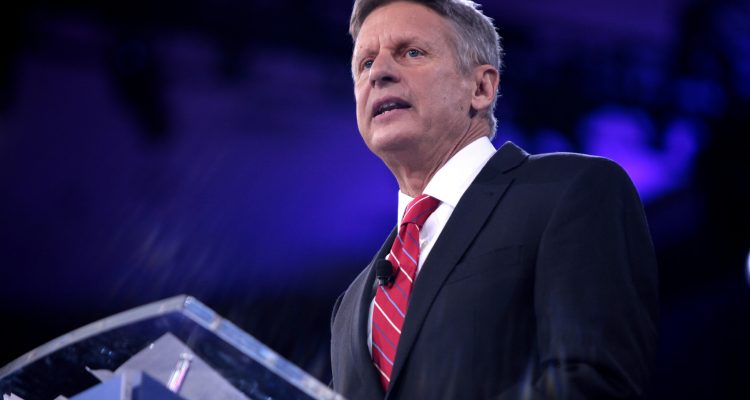I'm tired of political "business as usual". I'm sick of having my rights stripped away one at a time while the people around me don't seem to notice or care.
Because of his tax code:
"Today’s federal tax code does all the wrong things. It penalizes productivity, savings, and investment, while rewarding inefficiency and designating winners and losers according to political whim. For far too long, tax laws have been used not just as a means to collect needed revenues, but as a weapon with which to manipulate our behavior, create and destroy industries and fulfill politicians’ dreams of social engineering. The result is a tax code that is more than 70,000 pages long enforced by a government agency with almost 100,000 employees.
It is nothing less than a massive deployment of government force on our lives, our finances, and our freedom.
Governor Johnson advocates the elimination of tax subsidies, the double taxation embodied in business income taxes, and ultimately, the replacement of all income and payroll taxes with a single consumption tax that will allow every American and every business to determine their tax burden by making their own spending decisions. Taxes on purchases for basic necessities would be “probated”, with all other purchases taxed equally regardless of income, status or purpose.
Many leading economists have long advocated such a shift in the way we are taxed, and Gary Johnson believes the time has come to eliminate the punishing tax code we have today and replace it with a system that rewards productivity, investment, and savings. The IRS as we know it today would no longer be necessary, and Americans would no longer need to live in fear of the force of government being wielded under the guise of tax collection."
Because of his proposed term limits:
"Americans are increasingly frustrated, even angry, that — regardless of which political party is in control — nothing really changes in Washington, DC. The spending continues unchecked. The wars continue. The government keeps taking away more freedom. This disastrous allegiance to the status quo by career politicians is a direct result of the reality that those politicians are more concerned about keeping their jobs than about doing what needs to be done. That’s why Gary Johnson is a strong advocate of term limits. Run for office, spend a few years doing the job at hand and then return to private life. That’s what Gary Johnson did as Governor, and that’s what Senators and Representatives should do."
Because he wants to stimulate job growth:
"During the 2012 campaign, Gary Johnson was lauded for having the best “job creation” record of all the former governors running for President. His response: “As Governor, I didn’t create a single job.” His point, of course, being that government doesn’t create jobs — except for itself. Entrepreneurs, growing companies, and a robust economy create jobs.
Government’s role is to create and maintain a regulatory and tax environment in which private job-creators can prosper. Gary Johnson did that as Governor, and would do so as President. Government regulation should only exist to protect citizens from bad actors and the harm they might do to health, safety and property. Regulation should not be used to manipulate behavior, manage private lives and businesses, and to place unnecessary burdens on those who make our economy work. Eliminating unnecessary regulations and applying common sense to those rules that are necessary will free up capital and allow those who want and need to create jobs to do so.
Likewise, adopting the tax reforms Governor Johnson advocates will literally create millions of jobs. While most politicians, Democrats, and Republicans alike, suggest that modest reductions in business taxes might create jobs, Gary Johnson believes eliminating income taxes on businesses will transform the U.S. into the “job magnet” of the world. Why would any corporation move its operations off-shore when the best tax “haven” on the planet is right here at home?"
Most importantly because of his take on personal freedom:
"When you ask Americans today what the greatest threat to their individual liberties is, far too often the response is: “The government”. That is simply unacceptable in a nation that was literally founded on the notion of liberty.
Imagine the disgust of the Founding Fathers if they were to see the national government spying on citizens’ private communications, monitoring financial transactions, photographing license plates, and even demanding to know what a person is doing at a public library — all without warrants or due process of law.
Imagine their shock to learn that the government has decided it is appropriate to tell adults what they can put in their bodies — and even put them in jail for using marijuana, while allowing those same adults to consume alcohol and encouraging the medical profession to pump out addictive, deadly painkillers at will.
The list goes on, but the point is clear: Decades of ever-more-intrusive government has steadily eroded personal freedom in this country. Adults are no longer free to make their own decisions, and virtually no part of Americans’ private lives are today safe from government scrutiny and regulation.
Gary Johnson believes the government should be truly limited — limited in the way the Founders envisioned. Responsible adults should be free to marry whom they want, arm themselves if they want, make their own decisions about their bodies, and lead their personal lives as they see fit — as long as no harm is done to others. And they should be able to do so without unconstitutional scrutiny by the NSA, the ATF, the DEA or any other government agency."
Because of his take on immigration:
"Having served as Governor of a border state, Gary Johnson understands immigration. He understands that a robust flow of labor, regulated not by politics, but by the marketplace, is essential. He understands that a bigger fence will only produce taller ladders and deeper tunnels and that the flow of illegal immigrants across the border is not a consequence of too little security, but rather a legal immigration system that simply doesn’t work. Militarizing the border, bigger fences, and other punitive measures espoused by too many politicians are all simplistic “solutions” to a problem caused by artificial quotas, bureaucratic incompetence and the shameful failure of Congress to actually put in place an immigration system that matches reality.
Governor Johnson has long advocated a simplified and secure system of work visas by which willing workers and willing employers can meet in a robust labor marketplace efficiently and economically. Aspiring immigrants would undergo a background check, pay taxes and provide proof of employment.
Making it simpler and efficient to enter the U.S. legally will provide the greatest security possible, allowing law enforcement to focus its time and resources on the criminals and bad actors who are, in reality, a relatively small portion of those who are today entering the country illegally."
As a parent, because of what he has to say about education:
"Governor Gary Johnson was one of the first governors in the nation to propose and advocate a universally available program of school choice. He did so while governing with an overwhelmingly Democrat legislature and while facing a powerful teachers’ union. He was well aware that his proposal would not be enacted and would generate fierce opposition. However, he believed it was important to raise the issue and force the teachers’ unions to defend a clearly failing status quo.
More broadly, Gov. Johnson believes there is no role for the Federal Government in education. He would eliminate the federal Department of Education, and return control to the state and local levels. He opposes Common Core and any other attempts to impose national standards and requirements on local schools, believing the key to restoring education excellence in the U.S. lies in the innovation, freedom and flexibility that federal interference inherently discourages.
As Governor, he saw first-hand that the costs of federal education programs and mandates far outweigh any benefits, both educationally and financially."
Because we agree about abortion:
"Gary Johnson has the utmost respect for the deeply-held convictions of those on both sides of the abortion issue. It is an intensely personal question and one that government is ill-equipped to answer.
As Governor, Johnson never advocated abortion or taxpayer funding of it. However, Gov. Johnson recognizes that the right of a woman to choose is the law of the land today, and has been for several decades. That right must be respected, and ultimately he believes this is a very personal and individual decision. He feels that each woman must be allowed to make decisions about her own health and well-being.
Further, Gov. Johnson feels strongly that women seeking to exercise their legal right must not be subjected to persecution or denied access to health services by politicians in Washington or elsewhere who are insistent on politicizing such an intensely personal and serious issue. As Governor Johnson did support a ban on late-term abortions."
Because he wants to keep the government out of my internet:
"Gary Johnson has often said, “There is nothing wrong with the Internet that I want the government to fix.”
The Internet has literally changed the world and has done so largely without interference from the government. It is no coincidence that the unprecedented innovation and entrepreneurship — and the resulting improvements in our quality of life — that has occurred in cyberspace has happened in one of the last refuges of freedom.
It needs to stay that way.
Yet, there are increasing calls for government regulation and intrusion into the Internet. From some politicians’ suggestions of a government “kill switch” to recently-passed so-called Cyber Security legislation, the government is determined to insert itself into our freedom to communicate, conduct business and seek information via the Web.
The government is even demanding that it be granted special “back doors” into encrypted, private information held and moved by Internet providers. The excuse is security — a laughable concept from a government that has proven time after time to be incapable of protecting even the most basic data.
Gary Johnson has consistently opposed these attempts at government interference with the Internet, and as President would return the government to the side of freedom and innovation — not regulation."
Gary is the only candidate who I believe cares about the citizens of this country more than he cares about his own bottom line. He's the only one who points the finger at the real problem. At our overly strong centralized government. Not at the rich or the poor. Not at white people or black people. He doesn't advocate hating one another, or tearing down one group of people to lift up another. He just wants to fix the broken system.
Because this is the type of person I want representing my country:
Not either of these fools:

 Rob Lapham is running for U.S. House in the 2nd Congressional District. To be clear his district is down by Tallahassee and Panama City, so I can't vote for him. But if you live anywhere on this map I think you should!
Rob Lapham is running for U.S. House in the 2nd Congressional District. To be clear his district is down by Tallahassee and Panama City, so I can't vote for him. But if you live anywhere on this map I think you should!
 Artie Lurie is running for State House in District 90. He claims to be a vote for Liberty and Small Government. He's for tax reform and responsible gun ownership. He's been a member of the Libertarian Party since 1996 and has been living in Florida since '94.
Artie Lurie is running for State House in District 90. He claims to be a vote for Liberty and Small Government. He's for tax reform and responsible gun ownership. He's been a member of the Libertarian Party since 1996 and has been living in Florida since '94. James Morris is running for Bay County Commissioner in District 2. He wants personal and economic liberty and has a plan for securing it. He's lived in Bay County since 1974
James Morris is running for Bay County Commissioner in District 2. He wants personal and economic liberty and has a plan for securing it. He's lived in Bay County since 1974
















